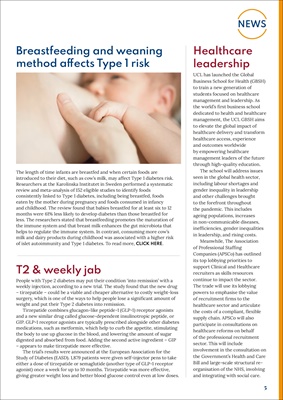
5
NEWS
Breastfeeding and weaning
method affects Type 1 risk
Healthcare
leadership
UCL has launched the Global
Business School for Health (GBSH)
to train a new generation of
students focused on healthcare
management and leadership. As
the world's first business school
dedicated to health and healthcare
management, the UCL GBSH aims
to elevate the global impact of
healthcare delivery and transform
healthcare access, experience
and outcomes worldwide
by empowering healthcare
management leaders of the future
through high-quality education.
The school will address issues
seen in the global health sector,
including labour shortages and
gender inequality in leadership
and other challenges brought
to the forefront throughout
the pandemic. This includes
ageing populations, increases
in non-communicable diseases,
inefficiencies, gender inequalities
in leadership, and rising costs.
Meanwhile, The Association
of Professional Staffing
Companies (APSCo) has outlined
its top lobbying priorities to
support Clinical and Healthcare
recruiters as skills resources
continue to impact the sector.
The trade will use its lobbying
powers to emphasise the value
of recruitment firms to the
healthcare sector and articulate
the costs of a compliant, flexible
supply chain. APSCo will also
participate in consultations on
healthcare reforms on behalf
of the professional recruitment
sector. This will include
involvement in the consultation on
the Government's Health and Care
Bill and large-scale structural reorganisation
of the NHS, involving
and integrating with social care.
T2 & weekly jab
People with Type 2 diabetes may put their condition 'into remission' with a
weekly injection, according to a new trial. The study found that the new drug
- tirzepatide - could be a viable and cheaper alternative to costly weight-loss
surgery, which is one of the ways to help people lose a significant amount of
weight and put their Type 2 diabetes into remission.
Tirzepatide combines glucagon-like peptide-1 (GLP-1) receptor agonists
and a new similar drug called glucose-dependent insulinotropic peptide, or
GIP. GLP-1 receptor agonists are typically prescribed alongside other diabetes
medications, such as metformin, which help to curb the appetite, stimulating
the body to use up glucose in the blood, and lowering the amount of sugar
digested and absorbed from food. Adding the second active ingredient - GIP
- appears to make tirzepatide more effective.
The trial's results were announced at the European Association for the
Study of Diabetes (EASD). 1,879 patients were given self-injector pens to take
either a dose of tirzepatide or semaglutide (another type of GLP-1 receptor
agonist) once a week for up to 10 months. Tirzepatide was more effective,
giving greater weight loss and better blood glucose control even at low doses.
The length of time infants are breastfed and when certain foods are
introduced to their diet, such as cow's milk, may affect Type 1 diabetes risk.
Researchers at the Karolinska Institutet in Sweden performed a systematic
review and meta-analysis of 152 eligible studies to identify foods
consistently linked to Type 1 diabetes, including being breastfed, foods
eaten by the mother during pregnancy and foods consumed in infancy
and childhood. The review found that babies breastfed for at least six to 12
months were 61% less likely to develop diabetes than those breastfed for
less. The researchers stated that breastfeeding promotes the maturation of
the immune system and that breast milk enhances the gut microbiota that
helps to regulate the immune system. In contrast, consuming more cow's
milk and dairy products during childhood was associated with a higher risk
of islet autoimmunity and Type 1 diabetes. To read more, CLICK HERE.